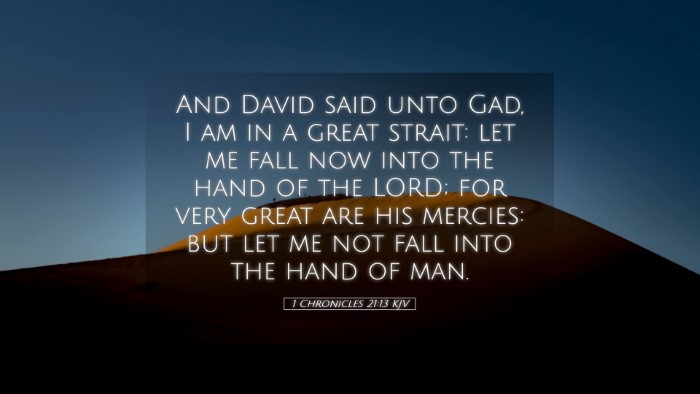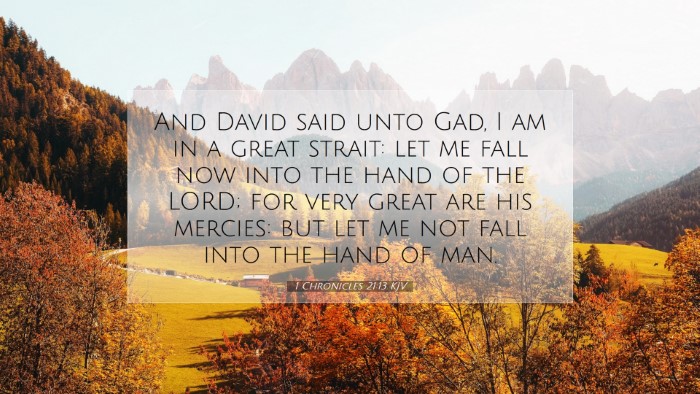Commentary on 1 Chronicles 21:13
“And David said unto Gad, I am in a great strait: let me fall now into the hand of the Lord; for very great are his mercies: but let me not fall into the hand of man.”
Introduction
The verse encapsulates a moment of profound introspection and penitence in David's life following a grave misstep in conducting a census of Israel. The context is pivotal as it reflects the tension between divine judgment and human consequence. By examining commentaries from esteemed biblical scholars like Matthew Henry, Albert Barnes, and Adam Clarke, we glean rich insights into the theological and moral implications of this verse.
Theological Context
This verse occurs in a narrative that presents David wrestling with the repercussions of his choices. Here, we see David acknowledging his sinfulness and choosing God’s mercy over human judgment—a theme that resonates throughout Scripture.
David's Quandary
Matthew Henry's Commentary highlights David’s internal conflict as he contemplates the dire options presented to him by the prophet Gad. David finds himself trapped between three severe judgments: famine, the sword, and pestilence. His choice reveals a deep trust in the Lord’s mercy, illustrating the belief that God's character is fundamentally compassionate.
The Nature of God's Mercy
Furthermore, Albert Barnes emphasizes that David’s request to fall into the hand of the Lord reflects not only despair but a strong reliance on God’s mercy. David is aware that the severity of man’s judgment could be brutal and unyielding. In contrast, he understands that God's hand, even in discipline, carries the potential for grace and restoration.
The Weight of Choice
Adam Clarke elaborates on the psychology behind David’s decision-making process, noting that the weight of sin drives him to seek deliverance from God rather than man. The options reflect a triad of judgment that portrays the grave consequences of sin. Clarke observes that David’s response is steeped in humility, recognizing his own frailty and the ultimate power of God's will.
Moral Implications
This narrative presents significant moral and ethical lessons relevant to pastorate, scholarship, and personal reflection.
- The Acknowledgment of Sin: The need for recognizing and confessing sin is critical. David’s admission of guilt precedes divine compassion, suggesting that acknowledgment is the first step toward redemption.
- The Importance of Divine Judgment: David's choice emphasizes that falling into God’s judgment may yield more restoration and hope than human judgment, which often leads to despair and hopelessness.
- Trust Over Fear: David’s decision exemplifies a profound theological principle: trust in God's mercy is paramount, even when faced with severe consequences.
Pastoral Applications
For pastors and leaders, this passage encourages the cultivation of a culture where the acknowledgment of failure and reliance on God’s grace is fostered. The narratives around repentance and mercy provide a foundation for pastoral care and counseling.
- Encouragement to Confess: Encourage congregants to approach God with their failings, knowing His mercies are promised and transformative.
- Teaching About God’s Character: Emphasize God’s character in sermons, focusing on His mercy and willingness to forgive.
- Cultivating Trust: Foster an environment that allows believers to trust in God rather than human systems of judgment.
Conclusion
1 Chronicles 21:13 stands as a poignant reminder of the human condition—the capacity for sin and the corresponding need for divine mercy. As David ultimately chose to rely on God, so too must we encourage one another to trust in the infinite compassion of our Lord. Reflecting on this verse allows theologians, students, and scholars to delve deeper into the nature of God's justice and mercy, recognizing the beauty of grace that surpasses human understanding.


